
The National Council of Architectural Registration Boards (NCARB) and National Organization of Minority Architects (NOMA) have released a report focused on disparities in architectural licensing examination. Titled Baseline on Belonging: Examination Report, the study seeks to explore factors that impact equity, diversity, and inclusion for candidates taking the Architect Registration Examination (ARE).
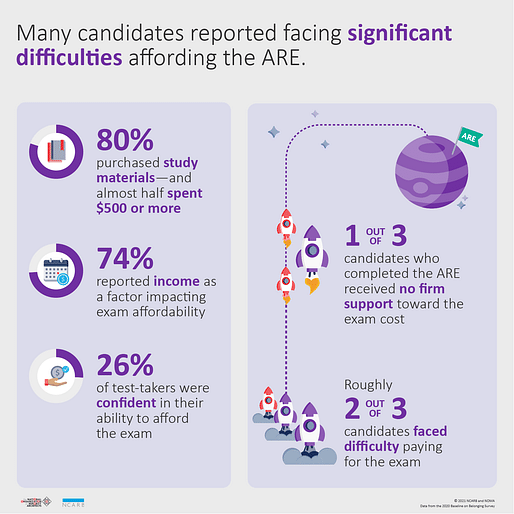
The 100-page report is centered on survey data from the experiences of people preparing for or taking the ARE, including obstacles in the areas of financial support, mentoring, and overall cost. More than 5,000 people submitted responses to the survey, including over 2,800 people of color and almost 2,500 women. The report also features an analysis of a multi-year collection of NCARB data, which as we previously reported, indicates that people of color have significantly lower pass rates in the ARE than their white peers.
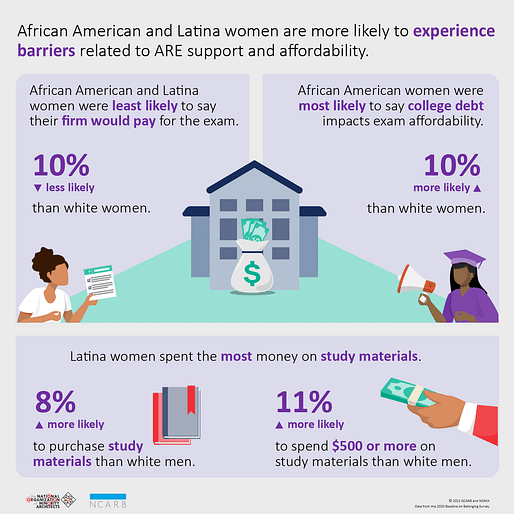
Among the key findings from the NOMA/NCARB report is that the cost of the ARE exam process is a considerable financial burden, with only 26% of respondents indicating they felt confident they could afford the ARE. The responses suggest that African American and Latino candidates are less likely to receive contributions from their firm towards the ARE costs, behind their white peers by 7% and 9% respectively. Also on cost, the data shows that African American candidates were 14% more likely than white candidates to report personal debt as a factor impacting their ability to afford the ARE.
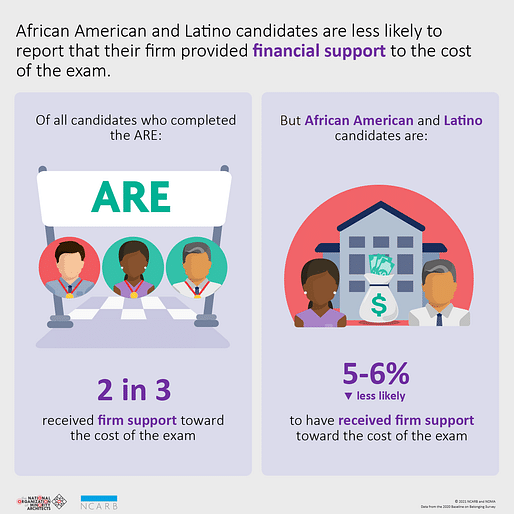
As we have previously reported, NCARB data has uncovered further disparities regarding pass rates for the ARE. Among the findings, pass rates for white candidates are 27-38% higher than their Black or African American peers. Meanwhile, African American and Latina women in particular are more likely to experience barriers related to ARE support and affordability, with Latina women 11% more likely than white women to report spending over $500 on study material, and 20% more likely to report difficulty paying for the exam.
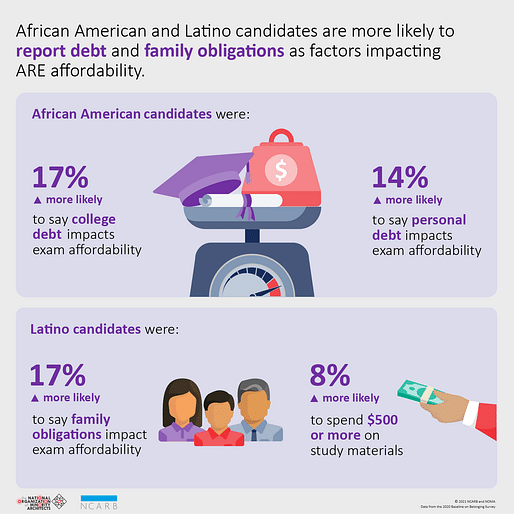
Other disparities included in the report focus on age and firm size. Individuals over 40 years old are 24% less likely to receive support from firms towards the cost of the exam, while large firms appear more likely than smaller firms to offer financial assistance towards the cost of the ARE (26% more likely) and study materials (41% more likely).
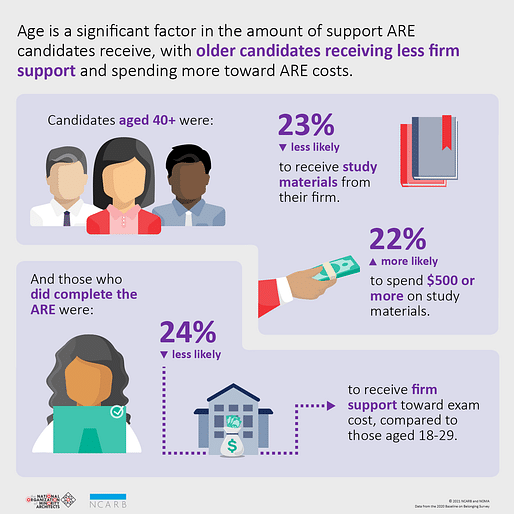
“The disparity in architecture exam pass rates is hard to see, but facing that number head on empowers us to ask better questions, and create new programs and policies that help ensure a successful career in architecture is both accessible and achievable to those historically marginalized by the process,” said NOMA President and Gensler Senior Associate Jason Pugh, commenting on the report.
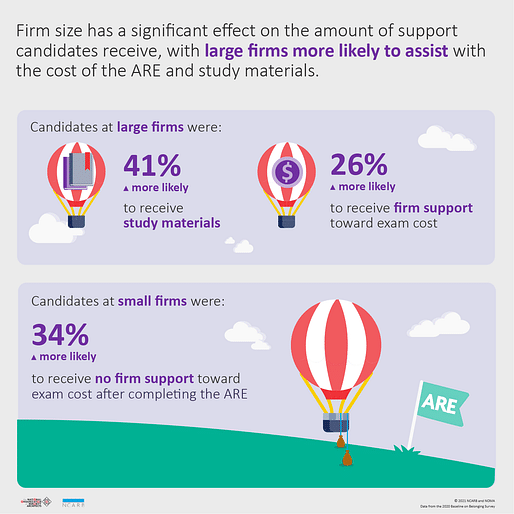
“The path to licensure is long, non-linear, costly, and strenuous, but even more so without the appropriate milestones to benchmark successes for people of color—and most drastically for Black and Latina women. NOMA leadership hopes to work collectively with the architecture collaterals to address the hurdles and challenges outlined within these clear findings over the next few years, and move us toward greater equity and representation overall,” Pugh continued.
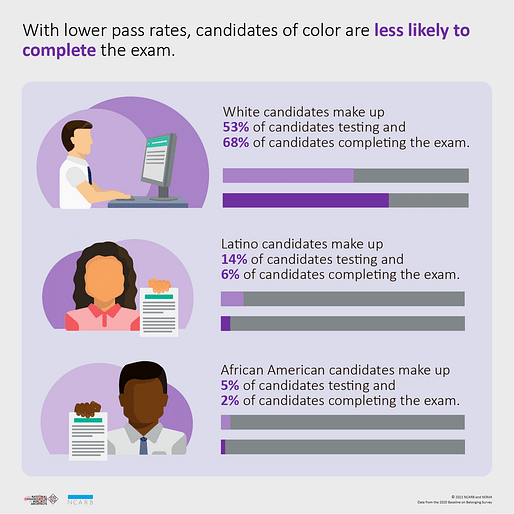
NCARB and NOMA describe the findings as “a first step in identifying and addressing pinch points during the examination component of the licensure path.” Going forward, the organizations will conduct focus groups and follow-up surveys, and explore the possibility of disparities in the ARE being impacted by additional disparities earlier in the education and licensing path.
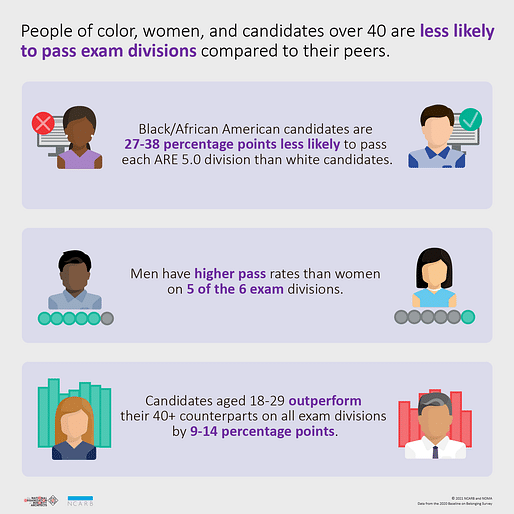
The numbers are the latest in a series of studies of NCARB data over recent months. In August, we covered an NCARB report on how architectural education had changed during 2020, as well as data showing that the total number of U.S. architects is continuing to grow despite COVID-19 disruption. In June, meanwhile, NCARB noted that the COVID-19 pandemic led to a 40% drop in newly licensed architects, with the delivery of AREs dropping by 44%.
No Comments
Block this user
Are you sure you want to block this user and hide all related comments throughout the site?
Archinect
This is your first comment on Archinect. Your comment will be visible once approved.